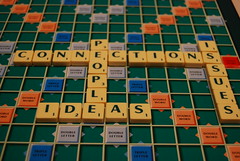It’s beginning to look a lot like Spring, isn’t it, University Park? I’m sure your weather is beginning to improve in State College as mine certainly is in Virginia. For this edition of my post, I had a few ideas for content: a post about drawing upon connections at Penn State, a post about resume tips, or a post about what kinds of thoughts should be going through your head when you receive an offer from a potential employer. Eventually I decided on the connections topic, but I welcome your feedback on the other two future topics (including which one I cover next and what I discuss in each). Feel free to reach out to me in the comments section or on Twitter (@smloewner).
Before I begin writing about connections and the human resources you have around you, I ought to mention that my prolonged absence between posts is due to a recent job opportunity I was offered and accepted. Although I was originally writing these entries as an employee of a political non-profit, I now work for a large consulting firm where I teach different agencies and organizations how to make the best use of online communications (specifically, social media). I mention the change because it’s going to be pretty significant in this post.
Connections at any stage of life are important. As a child, our main connections are with our parents or families who put us in a position to succeed. As we age, we might retain that connection, but we try to develop others: teachers, friends, community leaders. These are all very important, and if you’re about to graduate from college, they can be helpful for finding a place in the workforce.
Two specific types of connections can be very useful when you’re looking for a job as a soon-to-be Penn State Alum: other PSU Alumni and the faculty around you.
I was fortunate to meet a Penn State alumnus named Steve Kelmar through one of the College’s programs, and I asked if he might know anyone in DC whom I could have an informational interview with. He had a few contacts and he was actually excited to match us up – eventually, that led to me getting my role in the non-profit I worked for. I think I speak for most of my fellow alumni when I say that we love to help current students. You might not be able to draw upon the college’s already established programs for finding an alum, but there are many other ways to meet alumni (like this and this) – try to do so and consider using us as resources.
When it comes to helpful faculty, the College of the Liberal Arts is really ahead of the curve. These connections are a little bit different than the alumni-centric ones. Faculty may or may not know industry professionals that they could connect you to, but they can help you learn a lot about yourself. I mentioned that my new role in social media would be important, and here it is: It was only about 14 months ago that I even began to learn what social media is (and can be), and I only arrived at that point because of then-Professor (now Associate Dean) Long, who introduced the Liberal Arts Undergraduate Council to social media. Now, only about a year later, I’m working with it every day. Look for your faculty community to be more than just conveyors of lecture material. If their passion matches your passion (in this case, I think Dean Long and I share a passion for building online communities in new and innovative ways), draw upon it. You rarely get that opportunity with members of a business community. I learned that I love the theory behind social media and online communities, and I wouldn’t have done that if I hadn’t worked with members of the LAUS office. Those kinds of connections are definitely valuable for determining a good direction to take.
Can you think of other connections that students might draw upon while they’re an undergraduate? Do any other readers have experiences with connections they made in school leading to employment later on? As always, if you have questions about this post’s topic or anything else you want me to discuss, feel free to leave them in the comments.



